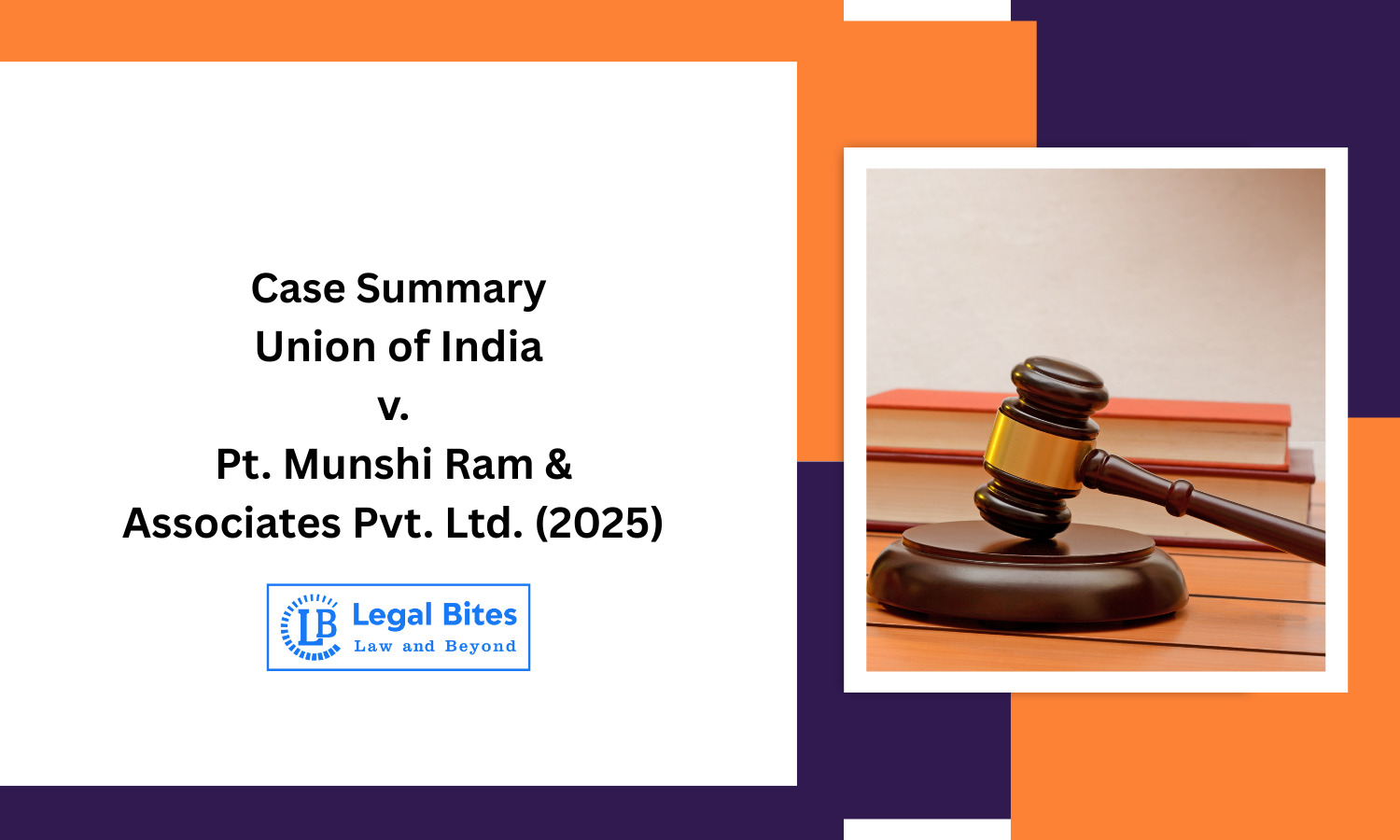
The case of Union of India v. Pt. Munshi Ram & Associates Pvt. Ltd. [FAO(OS) 1/2014 & CM NO. 93/2014] before the Delhi High Court highlights the strict approach of courts towards limitation in arbitration matters. Rooted in a protracted procedural journey—from arbitral award to objections under Section 34, followed by an appeal under Section 37 of the Arbitration and Conciliation Act, 1996—the dispute eventually turned on whether the 303-day delay in filing the appeal could be condoned.
The judgment, delivered on 03 September 2025 by Justices Anil Kshetrapal and Harish Vaidyanathan Shankar, underscores that condonation of delay is an exception, not the rule, particularly in arbitration cases where legislative intent prioritises speedy and final resolution of disputes. It also reiterates the settled principle that the Government stands on the same footing as private litigants in limitation law, and cannot take shelter under bureaucratic red tape or clerical errors to justify delays.
Background of the Case
The matter arises from an arbitral award dated 24.02.2011 in Case No. ARB/RJB/122, passed by a Sole Arbitrator against the Union of India. The Appellant challenged the award under Section 34 of the Arbitration and Conciliation Act, 1996, which was partly allowed by the Single Judge on 21.12.2012. Dissatisfied, the Union of India filed an appeal under Section 37 A&C Act.
However, the appeal was delayed by 303 days. Initially, the Division Bench dismissed it in 2014. A review petition (No. 323/2015) was also rejected. The Union of India then approached the Supreme Court (SLP (C) Nos. 17307-17308/2017, later Civil Appeal Nos. 1050–1051/2025).
On 27.01.2025, the Supreme Court restored the appeal, holding that dismissal merely on the ground of award execution was incorrect, as principles of restitution would apply if the award were set aside. The matter was remanded to the Delhi High Court to decide on the application for condonation of delay (CM No. 93/2014).
Appellant’s Case
The Union of India sought condonation of the 303-day delay, citing:
- Administrative approvals: Legal opinion sought on 11.02.2013 → sanction by DG, CPWD on 18.03.2013 → Department of Legal Affairs’ opinion on 08.04.2013.
- Appointment of Counsel: Government counsel was appointed on 11.04.2013.
- Clerical lapse: Relevant documents were allegedly misfiled by the counsel’s clerk with another case (Execution Petition No. 149/2011), causing a loss of time until August 2013.
- Drafting and corrections: Draft appeal prepared and revised in September 2013; final filing was done on 20.11.2013.
The Appellant argued the delay was neither deliberate nor intentional and sought a liberal interpretation in the public interest.
Issues
- What is the applicable limitation period for appeals under Section 37 A&C Act?
- Whether governed by Articles 116/117 of the Limitation Act, 1963 or Section 13(1A) of the Commercial Courts Act, 2015.
- Whether Section 5 of the Limitation Act can be invoked for condonation.
- Whether the 303-day delay in filing the appeal be condoned?
Legal Analysis
(a) Limitation Framework
- Section 37 A&C Act does not prescribe limitation → governed by Limitation Act, 1963 (per SC in Borse Brothers Engineers & Contractors Pvt. Ltd. v. State of Maharashtra, (2021) 6 SCC 460).
- The present case, being an intra-court appeal against a Single judge’s order, is covered by Article 117 Limitation Act (30 days).
- Since the appeal was filed in November 2013, long before the Commercial Courts Act, 2015, the CC Act timelines (60 days) do not apply.
(b) Delay Calculation
- Judgment by Single Judge: 21.12.2012
- Last date to file appeal: 20.01.2013
- Actual filing: 20.11.2013
- Delay: 303 days.
(c) “Sufficient Cause”
- The Court emphasised that condonation is an exception, not the rule.
- Cited Postmaster General v. Living Media India Ltd. (2012) 3 SCC 563: government departments cannot rely on bureaucratic red tape or impersonal machinery.
- Referred to Union of India v. Central Tibetan Schools Admn. (2021) 11 SCC 557: cautioned against the casual approach of government departments in litigation.
- Held that explanations like file movement, inter-departmental approvals, and clerical lapse are inadequate and unconvincing.
(d) Arbitral Objective
- Arbitration law emphasises the speedy resolution of disputes.
- Allowing such belated appeals would defeat the purpose of the A&C Act.
- Courts must avoid condoning negligence under the guise of “sufficient cause.”
Judgment
- The Division Bench found no credible or persuasive justification for the 303-day delay.
- The application for condonation of delay (CM No. 93/2014) was dismissed.
- Consequently, without entering into the merits, the appeal itself was dismissed as barred by limitation.
- No order as to costs.
Key Takeaways
- Strict timelines in arbitration matters: Even government litigants cannot claim indulgence on grounds of bureaucratic delays.
- Article 117 Limitation Act applies: For intra-court appeals in arbitration cases filed before the CC Act, limitation is 30 days.
- “Sufficient cause” must be real and convincing: Mere administrative delays and clerical errors are insufficient.
- Objective of arbitration law: Speed and efficiency override leniency in limitation.
Conclusion
The Delhi High Court reaffirmed the principle that condonation of delay in arbitration appeals must be rare and exceptional. The Union of India’s 303-day delay was held to be unjustifiable, as it lacked bona fide grounds. Thus, the appeal was dismissed at the threshold, upholding the arbitral finality and reinforcing judicial disapproval of government lethargy in litigation.
Important Link
Law Library: Notes and Study Material for LLB, LLM, Judiciary, and Entrance Exams